What a pregnant girl needs. Happy pregnancy: what an expectant mother needs to know
- Pregnancy is not a disease, but a double responsibility. Therefore, restrictions, and not because you are put in the sick. The past life is already past life, and it will not happen again. Now you have new rules, you have to get used to them and quite sharply.
- Of course our grandmothers and even mothers they still walked the whole pregnancy on their feet and did not abuse the attention of doctors. Of course they didn’t do an ultrasound. Of course, they did not even think about taking these terrible drugs. And of course they all know on this topic and tirelessly educate you, as well as those who have given birth to friends, relatives of the husband and employees at work. And of course your right to follow their advice and not go to the doctor, so as not to heal. But be aware of the strong change in state and the environment and human health. Consider - it might make sense to take advantage of the progress made and identify or prevent possible deviations in time! After all, the exhibits of the Kunstkamera are 300 years old. And now the health of the nation has not changed for the better. The concept of modern obstetrics is a carefully planned desired pregnancy.
- In general, with an irrational lifestyle, such as alcohol, antibiotics, flu, hormones, etc., it is necessary to protect yourself with a condom during the entire cycle. But if pregnancy occurred in this cycle, keep in mind: from the point of view of classical medical genetics, an abortion is indicated. Guarantee healthy child no one can. But in the early stages, damaging factors act according to the "all or nothing" law, that is, they either kill the embryo and cause menstruation, or they do not damage, and the pregnancy develops normally. This is usually the case. But no one can give guarantees, so the decision is yours. As you understand, no one can give guarantees without this, and abortion does not improve the prognosis. Just do not fall into doubts about any virtual diseases such as "ureaplasmosis" based on the results of a random DNA examination in paid clinic... It's not even worth your thoughts.
- Bloody discharge on the days of expected menstruation - the so-called. "Washing the fetus" is not the norm, but the threat of interruption. As well as pulling pains lower abdomen. This always requires a visit to a doctor and urgent action for conservation.
- You need to go to the doctor and get recommendations on lifestyle and what to take and what to drink, - as soon as they learned or suspected their pregnancy.
- Ultrasound is not harmful. At any time and with any modern sensor. The fetal heartbeat should already be clearly detected by the vaginal sensor at 6 weeks. Early ultrasound is mandatory to establish pregnancy, its uterine localization and the fact of its development - a living embryo.
- Weeks are considered obstetric - from day 1 last menstruation. At irregular cycle and an obvious discrepancy, the period is calculated according to the ultrasound data, but they still call it in obstetric weeks - from the first day of the conditional last menstruation, which should have been on that day, so that the period was the same as it is determined now on the ultrasound scan :) do not bother - the period is considered in obstetric weeks, and full-term pregnancy is 38–40 weeks. Nobody knows the day of fertilization, because it does not correspond to the day of intimacy and even the day of insemination. Sperm cells live in the genital tract for up to 7 days. Only with IVF and embryo replanting is the exact date from fertilization known. But they use it all the same obstetric weeks- add 2 more weeks to this period.
- No-shpa is harmless ... It can be done in the first trimester. In the second half, magne B6 is more suitable. These are harmless drugs, unlike ginipral.
- Dexamethasone and metipred are prescribed according to indications ... Annotations to them (especially to dexamethasone) were written a very long time ago and do not take it into account wide application in obstetrics. When you are terrified of the side effects, look at what doses it concerns, and when the drug is used in general. These side effects described when using hormones to treat systemic lupus erythematosus, rheumatoid arthritis and other diseases - these women also want to give birth - and then they write about side effects during pregnancy. But their therapeutic doses are several tablets a day for years. With hyperandrogenism in obstetrics, fractions of a tablet are used, maximum - one and a half a day - for weeks. The excess of male hormones simply makes pregnancy impossible. Here the choice is either pregnancy or hormone. Hyperandrogenism is a scourge modern women... Many people have to drink dexamethasone during pregnancy. Don't bully your brains once again... Better do more often tests(blood hormones DHEA-S and 17-hydroxyprogesterone) for dose control.
- You need to be examined and do tests not to add money to the doctor's pocket, but in order to notice in time possible violations and not bring the situation to a neglected one. The ideal of the survey is once every 4 weeks with complete well-being and once every 2 weeks a retake of the analysis that was bad the last time - 2 weeks after the start of the correction. The full examination algorithm is given in the "Analyzes" section, and in the article "Planning a pregnancy in numbers (price of a child)" - it is indicated along with prices, as well as the newborn's dowry and mother's expenses for pregnancy and 1 month of life.
- Sexual life - if there is no threat, placenta previa and isthmic-cervical insufficiency - at your discretion. In general, much is at your discretion - evaluate your reactions and stop all actions that cause discomfort, pain, discharge - and inform your doctor. The rest is possible if the doctor gave the go-ahead. But sex life- only with a condom! You do not need an aggravation of thrush and other joys now.
- Do not forget about vitamins for pregnant and lactating women - all the time, throughout the pregnancy, no matter how right you eat. Large children are not born from Materna :) There is no iodine in Elevit, if you follow the fashion - do not forget to supplement the fashionable Elevit, which has very little at all :) - potassium iodide 200 mcg per day. Folic acid be sure to take up to 12 weeks, 3-4 tablets per day, regardless of how much it is in your multivitamins, and then - not necessary, but desirable. Strictly with food or after meals, so as not to aggravate gastritis.
- The plane is dangerous at any time. As well as changing the climate and moving away from the observing doctor. Now you will go on vacation with your child, about two years later. That's right, come to terms with it.
- From the second half of pregnancy, water-salt metabolism in the body changes. Water begins to be stored, everything that you drink in the form of a free liquid remains and seeps into the tissue, the more, the more salt is in the food. Until 20 weeks, you may not gain a single kilogram or, on the contrary, lose weight. After 20 weeks, a rapid increase will begin - it's not your baby's weight, it's water. From 20 weeks you need to change your drinking regimen and a diet, but it is impossible to do this in one day, you will have to get used to the inevitable restrictions in advance - from 16 weeks. Then by 20 it will be easy for you to follow everything, and you will avoid the delights of gestosis. So, free fluid leaves the blood, does not go to the child, and everything remains in your tissues - in the form of first hidden, and then visible edema. When the ring will not be removed from the finger, this is already a hospitalization situation. First, your face will be rounded and you will begin to add weight noticeably. Everyone will be happy and moved, except for your doctor. Keep in mind - the main thing is not to restrict the liquid, a person cannot take and stop drinking. The main thing is to exclude salt from food. Absolutely exclude - not only in the form of a white powder - not just do not add salt, do not add to food when cooking, do not eat in canteens where you cannot control this, but also exclude foods that contain a lot of salt from the diet - we are not discussing salted fish and cucumbers, these are things absolutely contraindicated in the second half until childbirth, but besides them, you need to throw out the sausage, especially smoked, all canned food and hard cheese. You give your husband a personal salt shaker and prepare products that do not require active salting - porridge, etc. Do not worry, you still cannot completely eliminate salt - it is everywhere, even in bread. When you accomplish this feat, you yourself will want to drink much less than usual. It is not necessary to restrict the flow of fluid; with a complete rejection of salt, it will be enough just to shift the balance towards bound, not free fluid - that is, there are juicy foods, fruits, vegetables. Market cottage cheese, fruits and berries in any quantity, even if watermelons are not juice or compote, but a natural apple - these are the features of the diet of the second half. The bound liquid in whole fruits does not go into edema, but remains in the blood, goes to the child, the peel of these whole fruits will help with stool, vitamin benefits is also there. The favorite excuse of pregnant women, "I generally drink a little", does not go away. A lot, a little - you can control everything yourself, in difficult cases when the puffiness persists - keep a diary "drunk / allocated." Not only free liquid is added to "drunk", but also total weight fruits, vegetables, soups, yoghurts, salads, etc. In "highlighted" - highlighted, measured in a measuring cup. Some preponderance in the direction of "drunk" will be - the weight of the peel of apples, etc. :). You yourself, keeping this diary do not less than a week, you will understand what a difference between the columns is normal for you - when you do not swell and do not suffer from thirst. This diary will help to objectify your water-salt metabolism, otherwise the doctor will insist that you drink a lot, and you - that you are dry. Do not forget that sweets also increase thirst, and therefore it is not that it is impossible, like salt - but just think for yourself what foods you can eat without feeling the desire to drink them with a liter of water - this is a diet that will be right for you. To some, it may seem that simply limiting water, especially in winter, is easier than changing the entire diet and giving up cucumbers. And for some, it's even easier to drink diuretics. It's a delusion. Firstly, blindly restricting fluid and taking diuretics only enhances the body's ability to store water and swelling (as it is written in all foreign manuals, which they like to refer to), and secondly, under conditions of dehydration, the kidneys suffer, infection develops in them, the main point treatment which becomes plentiful drink, and it is impossible to choose which is more important. Therefore, there is no need for extremes. Throw away the salt, and you will not have any more problems in this matter, you will not have to sacrifice a sip of water and earn pyelonephritis. After giving birth, everyone happily notes that although they can do everything, ordinary food seems very salty, and they salt much less. We are not getting younger, in mature age refuse salty because of high blood pressure it will be much more difficult, such an incentive as pregnancy is no longer strong, use it to improve your lifestyle - not only for these 9 months, as a sacrifice for the sake of a child - but for yourself, your health and beauty - with pleasure!
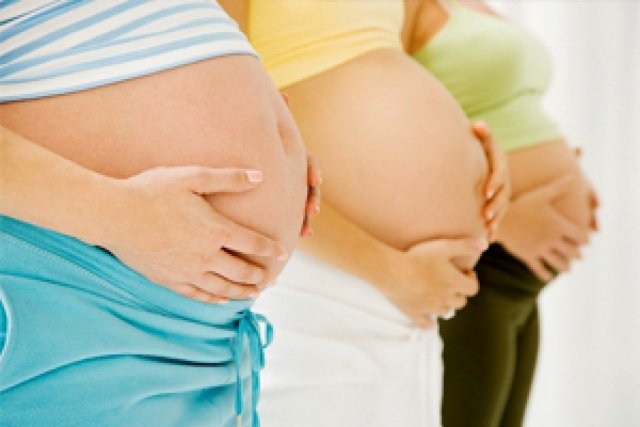
I know what they write abroad - the less liquid, the more swelling, so drink more. I disagree with the fact that you need to drink more, everyone can try on themselves and their child, which will lead to "drinking more", but the fact that the blind restriction of fluid with unchanged salt intake will lead to an even greater accumulation of water by the body - I seem to be I wrote, so there seems to be nothing to justify, although still not everyone notices what I am writing and thinks that I still restrict the liquid :))) Well, I can't cope with a damaged phone, so I wrote an explanatory note for those who will misunderstand this point :)
Yeah, here Feedback informs that again it is not clear, they say that if you do not drink a lot of liters of water a day, you will be dehydrated. No, there will be no dehydration if you throw out salt and consume a lot of bound liquids, that is, an unlimited amount of fruits and vegetables, cottage cheese and yoghurts + 2-3 cups of free liquid, more often kidney herbs - but this already depends on the individual situation. Dehydration is caused by a mismatch between the amount of salt and the amount of fluid. If you limit the liquid and leave sausage and cheese in the diet, then you will be dehydrated. Throwing away the salt will help you drink less and stay hydrated. If you do not change the amount of salt and drink a lot, there will be swelling in the mother and lack of water, that is, dehydration in the fetus. Free water does not go to it. Oppose at least.
Nutrition in the first trimester of pregnancy is a special topic. After all, right now it is tormenting you (if not, then thu-thu-thu!), And just looking at the products turns you out. But what to do, because there is something you need? Now more than ever it is necessary to eat properly and in a balanced way, because the health and development of your baby directly depends on it.
So. You and I are pregnant. What and how do we do it? What do we refuse and what, on the contrary, do we rely on? How many times a day do we eat? About this and everything related to nutrition at early dates pregnancy, this article.
First: by means of we are fighting toxicosis.
Yes, yes, these are not fairy tales. Properly organized (in terms of quantity and quality) nutrition significantly reduces the manifestations of toxicosis. This requires:
- eat often (5-6 rubles per day), but in small portions;
- take the first meal (it can be croutons or something light) right in bed;
- drink a lot between meals pure water(up to 2 liters per day);
Second, we eat healthy and wholesome food.
We forget about hot dogs, french fries, fatty dishes, smoked meats (this applies to both sausages and fish), pickled, salted and canned food, ketchups, mayonnaises. Sweet soda (especially Coca-Cola) and all foods containing artificial colors (even yoghurt) are not at all tasty to us. When asked to drink a couple of sips of wine or beer, we answer: "Ugh, what disgusting!" and do not give up on any pretext.
Now we have steamed, boiled and baked vegetables, meat, eggs, cheese, fresh salads, fruits on our table. Necessarily - greens. Let's not forget about fish. We replenish calcium reserves by eating dairy products, primarily cottage cheese.
We are wary of allergenic products (chocolate, honey, citrus fruits, etc.).
Third: if we want something, it's not just that. It means that we really miss this "something".
There are numerous anecdotes and stories about the "food whims" of pregnant women. But what a woman wanted in the middle of the night seaweed or chewing on the wall is not a kick. This is a signal from the body about the lack of the substance it needs, in the examples given - iodine and calcium. Often, pregnant women do not have enough iron. This substance provides normal level hemoglobin, which is needed to carry oxygen to tissues. If mom has anemia, baby experience oxygen starvation... It can be obtained from red meat, fish, egg yolk, apricots, dark green leafy vegetables and grains.
Fourth, we do not forget to take the vitamins prescribed by the doctor every day.
Today's ecology and health of pregnant women, unfortunately, are not in the most ideal states... Therefore, for each woman, the doctor prescribes vitamins necessary at the stage of gestation, and then feeding, a child. We are no exception. Every morning (or lunch, depending on how it is written in the instructions) we honestly take that supplement the diet (calcium, potassium, phosphorus, iron, vitamins B, C, A, E, etc.) and do not lead to excess body weight.
Fifth: we do not want to overgrow with unnecessary fat, so we eat not "for two", but "for one, but with good quality."
Do not listen to your mothers and grandmothers that now you simply have to eat for two. Pregnancy is not a reason to absorb food, if not in tons, then in buckets. This is for nothing but to overweight, will not. Now, when our body expends additional energy and irreplaceable substances, it is better to focus on the quality and usefulness of products. Therefore, those who have not fully mastered the "golden rules of nutrition for a pregnant woman" returns to the beginning of the article and reads the point "Second ...". By medical indications, an average-sized woman should gain about 13 kilograms during pregnancy. Plus or minus a few kilograms is considered normal. With regard to weight gain in the first trimester, it has been proven that at this time it is absolutely independent of nutrition.
And one more thing: we are not doing stupid things, namely, we are not dieting.
Pregnancy is not the time for experiments and, moreover, for tracking your figure in this way. If you are very afraid to get better, do better fitness for pregnant. This is useful for both you and your baby.
Sixth: we are smart and everything will work out for us.
Yes, it is very difficult for us to rebuild our eating habits at one point. But we understand that this must be done for the sake of a crumb, whose health depends directly on us. And we not only understand, but also do. And we succeed. And very soon, well, after some 8 months, a miracle will happen, and we are no longer just pregnant, we are already MOMS.
Specially for- Olga Pavlova
The first pregnancy is an important and exciting stage in the life of every woman. Moms-to-be try to absorb maximum amount information about this unusual state. And this is not surprising, because the lack of experience often leads to the fact that the expectant mother has absolutely no idea at the first pregnancy what to know and do, how to behave correctly. In this article, we will cover the main points and provide the most important recommendations for expectant mothers.
The first signs of pregnancy
The main signs of pregnancy are a delay in menstruation and two strips on a special test. But there are other symptoms for which early stages it is possible to determine the probability of a woman's pregnancy, since the belly in the first weeks of pregnancy, of course, does not grow.
- Emotional instability. This is perhaps the most common sign and sensation in the first week of pregnancy, especially in emotional woman... It becomes difficult for her to control her emotions. Outbursts of joy give way to tears. Also, increased irritability is often observed, as well as the lability of emotions: the same event either angers her, then upsets, then makes her laugh. This condition is caused by hormonal changes in the body of a pregnant woman.
- Changing taste preferences. Food may appear undersalted and bland. There is a desire to eat the food that was usually not included in the woman's diet.
- Nausea. It manifests itself early toxicosis... The symptom is not observed in all women. There may be pronounced nausea, which is accompanied by vomiting, or vice versa - slight nausea, dizziness.
- Swelling of the mammary glands. In the early stages, it does not appear very often, it is also accompanied by protruding veins on the chest. A woman can feel slight pain in the mammary glands, tingling.
- complete aversion to previously loved food;
- distorted perception of smells and tastes: a pregnant woman may smell gasoline from fruits or a metal taste from ordinary food;
- increased sleepiness: a woman can sleep for 12 hours and still feel tired. I constantly want to lie down, there is no desire to be active.
By and large, the first visit of a pregnant woman to a gynecologist is not much different from a standard examination. To confirm pregnancy, your doctor will examine your vagina using a speculum and palpation. In the process, he will take a smear on the flora and draw the necessary conclusions about the general condition of the uterus, its cervix, appendages and the vagina as a whole. In the future, such inspections will no longer be carried out. The gynecologist will be limited to feeling the abdomen on the couch.
Also, in the early stages of pregnancy, ultrasound will help to more accurately identify it, with which you can also determine the exact date.
On the couch, the gynecologist will additionally take measurements of the pelvis and waist. Then you will need to weigh yourself and clarify the woman's height. Blood pressure is also measured on both hands.  All data will be entered into exchange card, which after the first examination will be given to the pregnant woman. There will be added notes about the state of health, availability different kinds chronic diseases, traumas suffered, illnesses, operations that took place in the life of a woman and her immediate family.
All data will be entered into exchange card, which after the first examination will be given to the pregnant woman. There will be added notes about the state of health, availability different kinds chronic diseases, traumas suffered, illnesses, operations that took place in the life of a woman and her immediate family.
You need to be prepared for the doctor to ask questions about the first menstruation, about the beginning of sexual activity, he also needs to know about the bad habits and lifestyle of the pregnant woman. All this is not an idle curiosity of a doctor, but important and necessary data that will help determine general state health and predict the course and development of pregnancy.
Important! There is no need to be shy and hide facts about your health from the gynecologist, which, perhaps, you would like not to advertise. The specialist will certainly keep your secret, but will have information about possible reasons complications of pregnancy. Prepare for your doctor's appointment, be prepared to be clear and specific about yourself.
After all of the above, the nurse or the doctor himself prescribes referrals to the woman for necessary examinations and tests that will need to be passed in the near future. 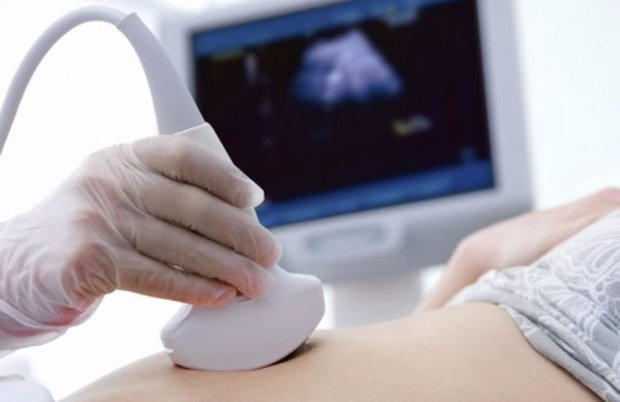 Usually, at the first visit, the doctor recommends vitamins or other medical drugs that help to adjust the level of hemoglobin and increase the amount of trace elements needed for pregnancy.
Usually, at the first visit, the doctor recommends vitamins or other medical drugs that help to adjust the level of hemoglobin and increase the amount of trace elements needed for pregnancy.
What to do during pregnancy
If a woman is used to leading healthy image life, then she will not have to introduce special changes into her everyday life. But along with this, there are some features that you still need to know about. expectant mother.
Did you know? In Japan, women go on maternity leave not at the end of pregnancy, but at the beginning of pregnancy.
A categorical "no" to bad habits
The expectant mother must firmly understand that drinking and smoking during pregnancy is unacceptable. Nicotine negatively affects nervous system(central and peripheral). It is in women who continued to smoke during pregnancy that preterm birth, intrauterine fetal death, and miscarriages most often occur.
As for the use alcoholic beverages, then as a result of this, a child may be born with various deviations in physical and mental development.  These are not ordinary horror stories, but a reality that depends only on the woman. It is important to understand that now you are responsible not only for yourself and your health, but also for your child, who so far cannot choose whether to poison his body with poison or not: you do it for him. Give up bad habits not so difficult if you understand who you are doing it for.
These are not ordinary horror stories, but a reality that depends only on the woman. It is important to understand that now you are responsible not only for yourself and your health, but also for your child, who so far cannot choose whether to poison his body with poison or not: you do it for him. Give up bad habits not so difficult if you understand who you are doing it for.
The normal development of the fetus and the favorable course of the entire pregnancy directly depend on rational nutrition future mother. Usually in 9 months a woman gains about 9-13 kg in weight. In the second half of pregnancy, normal weight gain does not exceed 300-400 g per week. It is impossible to write down the diet for every day, but we will give some basic nutritional rules below.
Eat small meals more often. Ideally, you will eat 5-6 times a day, but little by little. Protein food for a pregnant woman, these are dairy products, lean meat. As for carbohydrates, which will reimburse the costs of the pregnant woman's body, you should use oatmeal and buckwheat, rice.
You should eat a variety of vegetables and fruits every day, which will fill the body with the necessary vitamins. About 35-40% of the fat in the diet should be vegetable, not animal oils. Lard and fatty meat are best minimized or not consumed at all. In the second half of pregnancy, it is advisable to exclude spices, smoked meats, too sweet and salted food from the diet. 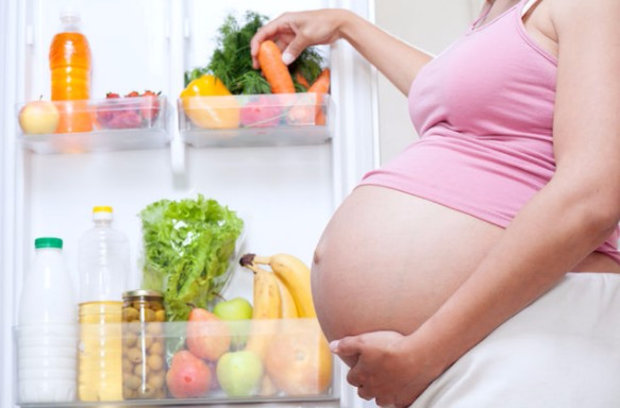
Did you know? The approximate daily calorie content, which can be taken as a basis and adjusted depending on the lifestyle of the pregnant woman, should be 2400-2700 kcal in the first months of pregnancy and 2800-3000 kcal, starting from the fifth month.
Vitamins are especially important during pregnancy. If in summer and autumn they can be taken from fruits and vegetables, then in autumn-winter period you need to compensate for the lack of vitamins by taking multivitamin complexes and drugs. It is recommended to consult a doctor before choosing one or another complex for yourself. A pregnant woman needs an iron that helps to form in the fetus circulatory system, in calcium, which nourishes the skeletal system.
It is not recommended to use a large number liquids, as water will be retained in the body, resulting in swelling. You need to drink peeled or mineral water, light tea, milk, juices (not purchased, but prepared by yourself). It is advisable to exclude carbonated drinks.
Important! About a month before giving birth, use sesame oil should be stopped: during this period it is not the most the best way affects the body of a pregnant woman.
A woman should always monitor the purity of her body, but during pregnancy, this should be especially scrupulous. A daily bath or shower will help refresh and relax your body. 
Important! From the eighth month of pregnancy, you cannot take a bath: replace it with a shower.
Baths and saunas should not be visited, as this may cause premature birth... Wash the genitals carefully, but regularly and thoroughly. Douching is allowed only after the recommendation of a doctor.
Also, during pregnancy, you need to pay attention to your teeth. The body loses mineral salts, as a result of which it suffers tooth enamel... It is necessary to cure all aching teeth: it is safe during pregnancy and even necessary.
Comfortable clothes
Changes in body shape should entail changes in a woman's wardrobe. You need to choose those clothes that will not hinder your movements. It should be comfortable, free, and not squeeze the belly. Remember that too tight a waistband or rubber bands in regular stockings can compress the veins, which can impede circulation and can lead to varicose veins in your legs.  When it comes to footwear, choose a stable, wide heel. During pregnancy, the center of gravity shifts forward as the belly begins to grow. In this regard, at a high and thin heel keeping balance can be not only unusual, but also quite difficult.
When it comes to footwear, choose a stable, wide heel. During pregnancy, the center of gravity shifts forward as the belly begins to grow. In this regard, at a high and thin heel keeping balance can be not only unusual, but also quite difficult.
Physical exercise
Physical exercise should be regular, but not heavy. Performance special exercises several times a week for 15-20 minutes - perfect option for a pregnant woman. With their help, you can improve sleep, appetite, develop correct breathing and also strengthen abdominal Press and the muscles of the perineum, which can facilitate the process of childbirth.
Important! In women who perform lungs physical exercise during pregnancy, nausea and vomiting are less common.
Special complex necessary exercises the instructor in the antenatal clinic will be able to train a woman. 
Full rest
Full rest and healthy sleep- the guarantee of a stable and correct course of pregnancy. You need to sleep at least 8 hours a day. It is advisable to take short slow walks before bedtime, breathe fresh air... The room also needs to be regularly ventilated. Fresh air has a beneficial effect on both the mental and the physical state pregnant woman. It also has a beneficial effect on the fetus, which is especially sensitive to a lack of oxygen.
You can take sunbaths, but only as directed by a doctor and no longer than 15 minutes. Swimming in the river or sea is allowed for women whose pregnancy is proceeding in a healthy way.
Important! Traveling to the sea for women during pregnancy is not recommended if they usually live in a different climatic zone.
Reading additional literature
Pregnancy - perfect timing in order to prepare for the birth of a baby, not only physically, but also in terms of acquiring the necessary amount of information. A woman who has been working all the time or wasting time on other things finally has time to read thematic literature and find out all the information that will be useful to her in the future.  Many women register and communicate with other expectant or real mothers in specialized thematic forums. There you can get advice and recommendations from more experienced women.
Many women register and communicate with other expectant or real mothers in specialized thematic forums. There you can get advice and recommendations from more experienced women.
In addition to thematic magazines, books are recommended for reading, which tell in detail about all stages of pregnancy, about preparing for childbirth, about the first days and months with a child. Also, with the help of such books, you will know how to properly care for your baby, how to communicate and educate him.
The correct emotional and psychological background, as well as being armed with information, will help you not to be afraid of childbirth, but also to enjoy every day and look forward to meeting your child.
Did you know? Scientists have proven that inside the mother, the baby can not only laugh and cry, but also dance. So listen to good music often.
Sexual relationship
Attitudes towards sex during pregnancy can change in both the woman and her man. Physically sexual relations can be as often as you and your spouse want, if there are no contraindications. An exception is also the case when miscarriages have previously occurred. Here you should refrain from sexual intercourse in the first months of pregnancy. In the weeks before childbirth, it is also advisable sexual intercourse stop. 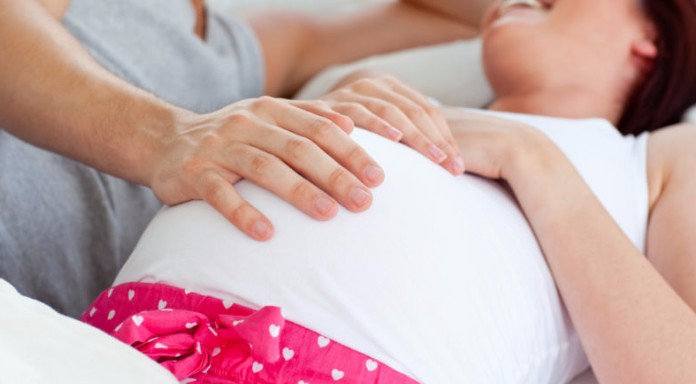
Examinations and tests during pregnancy
During pregnancy, expectant mothers differ in opinions regarding the examinations assigned to them. Some women complain that they have to take a lot of tests, while others, on the contrary, believe that their doctors do not check everything that may be harmful to the baby.
However, there is a minimum set of examinations and tests that every pregnant woman must undergo.
1 trimester.
![]() Healthy pregnant women are prescribed:
Healthy pregnant women are prescribed:
- General and biochemical analysis blood. Also, the blood is examined for clotting.
- Urine analysis (general).
- Studies are being conducted for the presence of HIV and syphilis, hepatitis C and B, various kinds of infections that can cause fetal malformations (herpes, rubella, etc.).
- The blood group and Rh factor are determined.
- An ECG (electrocardiography) is performed.
- Be sure to visit a therapist, ophthalmologist, ENT and dentist.
- At 10-12 weeks of pregnancy, you need to identify the risk genetic abnormalities, as well as defects in the development of the fetus. To this end, you need to spend biochemical screening... Blood is tested for pregnancy-associated plasma protein A and chorionic gonadotropin(HCG).
- During the same period, the first screening expert ultrasound scan during pregnancy is recommended.
- A pregnant woman takes a smear on the flora of the vagina, as well as tests for chlamydia.
If the expectant mother was sick with any chronic diseases, the volume of the above examinations may increase depending on the pathology.
2 trimester.
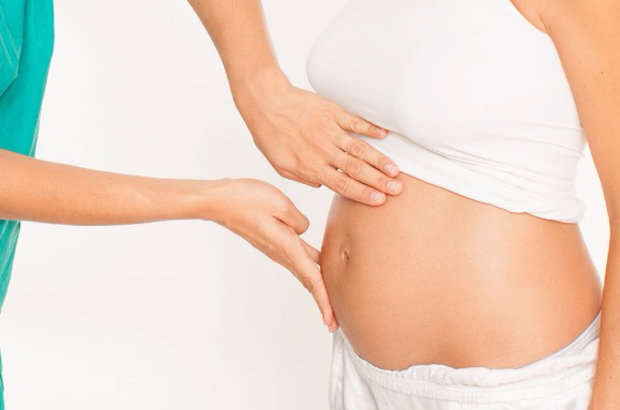 During this period, the frequency of visits to the doctor should be approximately once a month.
During this period, the frequency of visits to the doctor should be approximately once a month.
- Before each visit, you will need to take general analysis urine.
- As for the blood test, then with normal course pregnancy it is taken much less often: once every three weeks is usually enough. Naturally, in the presence of diseases or any complications, you will have to donate blood additionally.
- At 18-21 weeks of pregnancy, you will need to undergo a scheduled ultrasound scan.
- At 24-28 weeks of pregnancy, a woman undergoes a glucose test. The level is investigated in three stages: on an empty stomach, one hour after taking 75 grams of glucose and two hours later. This test helps identify latent diabetes in a pregnant woman.
- Checking urine to detect hidden infections.
- At the 30th week of pregnancy, a biochemical and general blood test is performed. Also, blood is checked for sugar levels and clotting. Blood is also donated for testing for HIV, hepatitis C and B.
- At 34-36 weeks, a smear is taken from a pregnant woman to determine the presence of pathologies in the vaginal microflora immediately before childbirth, and, if necessary, treat them.
- The third compulsory ultrasound is performed.
- CTG (cardiotocography) is used - this is a registration of fetal heart activity: it is necessary to determine the intrauterine state of the child.
Did you know?The size of a woman's leg during pregnancy can increase by one or even two sizes.
About three weeks before the expected birth, you should start preparing all the things and documents that will be needed in the hospital. 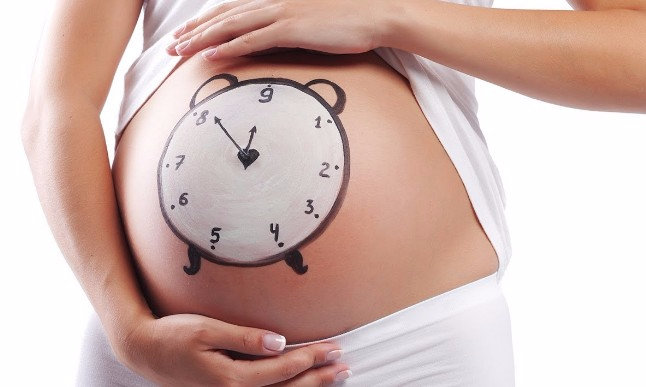 First of all, you need to take a passport from the documents. It is also imperative not to forget your card, where all the results of examinations and analyzes are registered. If you have signed an agreement with a doctor in advance or have a referral to the hospital, take these documents too.
First of all, you need to take a passport from the documents. It is also imperative not to forget your card, where all the results of examinations and analyzes are registered. If you have signed an agreement with a doctor in advance or have a referral to the hospital, take these documents too.
Things that a woman will need in a maternity hospital:
- nightgown;
- warm socks and slippers;
- terry towel;
- toothbrush and paste, shampoo and soap, comb and cosmetic bag with the necessary means;
- toilet paper and wet wipes;
- mineral water;
- money.
- a robe and a lidlin shirt that fastens in the front;
- gauze wipes (sterile);
- nipple cream;
- gaskets;
- bra for feeding the baby;
- enemas or laxative suppositories;
- plastic bags that can be used for dirty laundry.
Things for the child:
- blouses, sliders, bodysuits, hat, socks and diapers;
- diapers;
- powder or baby cream;
- wet wipes;
- baby oil.
Remember that doctors, who will always be there, will be able to come to your aid at any time. They will advise and prompt when the need arises. Therefore, first of all, you need to prepare for childbirth psychologically and emotionally.
